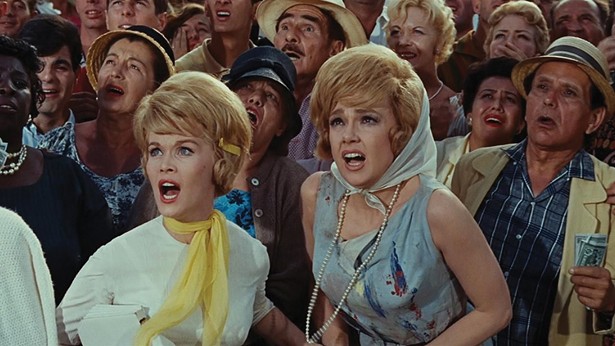
Here in the 21st-century US, we can trace so much of our current popular culture to East Asia. Think about it: What would life in modern America be like without sushi, manga, or karaoke? And now, add to the list the art of neo-benshi, which sees its practitioners replacing the dialogue of scenes from popular films with their own new, original—and often side-splittingly surreal—dialogue for audiences at live screenings.
After making its debut there four years ago, the craze will again return to Hudson Hall on July 30, when the Flow Chart Foundation will present “Flow Chart Cabaret Cinema: A Night of Neo-Benshi.”
“It’s a kind of poetic theater, really,” says Jeffrey Lependorf, the foundation’s executive director and the event’s curator. “Besides being hysterically funny and weird, it can also be serious and deeply moving. It’s not improvised: The poets who perform are each given a scene to work with, and they create and rehearse their pieces. It really runs the gamut, from high to low art.”
The medium of neo-benshi has its roots in the silent-film era in Japan, where, in lieu of running actual translated dialogue on screen, movie houses would hire benshi artists to narrate, describe, or explain what was being depicted. “Benshi is short for a term that roughly translates to ‘moving picture translation person,’” explains Lependorf. “These were very highly paid performers, and a lot of the American Westerns and other movies that the Japanese audiences were going to see were weird for them; something like, say, a saloon would’ve been unfamiliar to most Japanese people back then.”
Although the benshi vocation died out with the advent of talkies, the form was revived as neo-benshi several years ago by experimental poets in San Francisco and Los Angeles, who came up with the concept of adding poetry and other creative disciplines to the films being shown, instead of simply aping the storylines. The Flow Chart Foundation, an archive partially established to, according to its mission statement, “[explore] poetry and the interrelationships of various art forms as guided by the legacy of American poet John Ashbery and promote engagement with his work,” picked up on the phenomenon. The foundation hosted its first neo-benshi night at Hudson Hall in 2019 (last year’s program featured famed local musician Stephen Merritt).
Lependorf’s own segment will incorporate a poem by Ashbery, a longtime Hudson resident. The show’s other performer-poets include Madhur Anand, Dara Barrois/Dixon (nee Dara Wier), Sheila Maldonado, and Bruce Andrews and Sally Silvers, whose piece will set poetry and dance to the final scene of 1963’s epic comedy It’s a Mad, Mad, Mad, Mad World. Also performing: Tracie Morris, whose short Black Spring, a “poetic conversation in film” that “touches on Black trauma and police brutality among other themes,” will screen before the main performances.
The other films whose scenes will be neo-benshi-ized for the evening are A Streetcar Named Desire (1951), Anna Karenina (1935), and The Women (1939) and the Japanese cult classics The Thousand Faces of Dunjia (2017) and Matango: Attack of the Mushroom People (1963).
“The previous times that we did it sold out, and we’re expecting another great turnout this year,” Lependorf enthuses. “[The event] is a way to present poetry in a new context—one that even people who might find the term ‘poetry night’ scary will really love.”
“Flow Chart Cabaret Cinema: A Night of Neo-Benshi” will take place at Hudson Hall in Hudson on July 30 at 7pm. Tickets are $20.

















